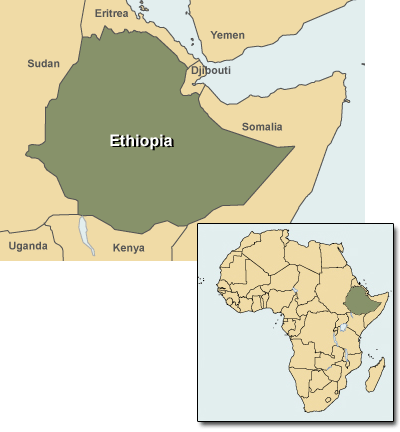
Ethiopia
Ethiopia is one of the poorest and most famine-prone countries in the world, with more than half of the population living on less than $1 per day.
The World Health Organization (WHO) estimates that more than 85 percent of diseases seen in Ethiopian health institutions are communicable. Lymphatic filariasis, trachoma, leishmaniasis, onchocerciasis, leprosy, schistosomiasis, and other so-called neglected tropical diseases are prevalent in Ethiopia.
Malaria is a large public health problem in the country, with 68 percent of the population living in malaria-endemic areas, according to WHO. In addition, HIV/AIDS, as in many African countries, remains a threat. WHO estimates that the national adult prevalence rate for AIDS is 6.6 percent.
NIAID Funding
NIAID funds several HIV/AIDS projects in Ethiopia specifically focused on mother-to-child transmission of HIV and women with HIV.
Scientific Advance
Between 2001 and 2007, NIAID funded three coordinated, large-scale, Phase III clinical trials to determine whether giving HIV-negative infants of HIV-infected mothers a regimen of nevirapine (NVP) for the first six weeks of life reduces the risk of HIV transmission through breastfeeding more than the current standard of care, which is a single dose of NVP given to the mother during labor and to the infant shortly after birth.
These trials, known as the Six-Week Extended NVP (SWEN) studies, were conducted in Ethiopia, India, and Uganda and were led by scientists from the host countries and The Johns Hopkins University.
In all three studies, the six-week NVP regimen was found to be as safe as and more effective than single-dose NVP in reducing the rates of postnatal HIV transmission and death in breastfeeding infants born to HIV-infected women.
Read Extended Nevirapine Regimens Reduce HIV Transmission and Death in Breastfed Infants of HIV-infected Mothers for more information.
Related Links
Government
Non-government
back to top